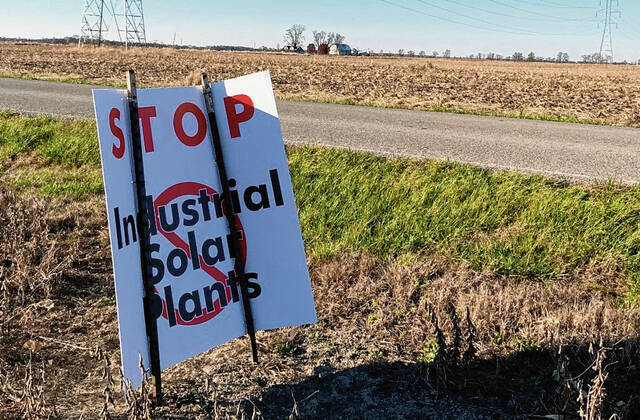Bartholomew County officials want to establish their own rules and regulations regarding the placement and layout of solar farms – before state lawmakers beat them to it.
The City of Columbus – Bartholomew County Planning Department has been asked to develop specific regulations regarding future commercial solar developments, city-county planner Jeff Bergman said. A key concern expressed by the Bartholomew County commissioners in their request was setback requirements from neighboring properties, he said.
At least three different solar power companies have expressed interest in Bartholomew County, Bergman said. However, no companies have formally issued the paperwork for a solar farm to be considered.
But when the first request comes before the Bartholomew County Board of Zoning Appeals, commission attorney Jim Shoaf said he anticipates a strong public reaction similar to what happened when county officials considered concentrated animal feeding operations in 2015 and puppy mills in 2021.
As of March 15, a local group called “Bartholomew County Citizens Concerned About Commercial Solar Fields” lists 119 followers on its social media site.
Bergman’s planning staff has been conducting research about the solar proposals for some time now, he said. In addition to setbacks, there are also additional topics that need to be explored such as a regulation for vegetative ground cover, he said.
While the BZA is given specific criteria in making decisions, members consider each request on a case-by-case basis and are allowed to add their own conditions, Bergman said.
One year ago, the county commissioners opposed House Bill 1381, which would have established the same regulations regarding solar power facilities for all 92 Indiana counties. In its original form, last year’s bill would have left each county without any say on where solar farms are installed, county commissioner and plan commission member Tony London said.
While the bill passed in the House and died in the Senate last year, London said he believes the concept will return next year.
“Don’t make the mistake of thinking it’s not going to come back,” London said. “It will likely return next year when state lawmakers create a biennial budget. If we don’t get these things under control, the state is going to come around and say if you don’t have a process in place, you no longer have a say.”
The current zoning ordinance indicates that power generation facilities are not a permitted use in any zoning district, but they can receive a conditional use permit in districts zoned agricultural preferred and heavy industrial, Bergman said.
Any proposed ordinance change will first go before the Bartholomew County Plan Commission, Bergman said. If that group votes in favor of the changes, their recommendation will move on to the county commissioners, who have the final say on whether new regulations are adopted.
London says he anticipates draft recommendations will come before the three county commissioners either late this spring or early this summer. Public hearings will be held at both the plan commission and county commissioners’ meeting when proposed changes in the ordinance are considered.
With or without ordinance changes, any developer who wants a conditional use permit for a solar power installation will have to go before the Board of Zoning Appeals, where a public hearing must be held, Bergman said.
London stressed that allowing the public to speak before any ordinance change or conditional use permit request is important to the county commissioners.
Mailings that will announce upcoming public hearings will be sent to neighbors. A legal notice is also published in the newspaper, and notifications will be posted at the proposed solar farm site.
If the new regulations work well for the county, Bergman said the Columbus City Council may consider similar regulations for its two-mile jurisdiction outside the city limits.





